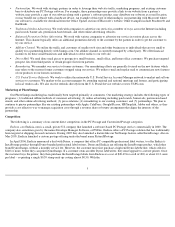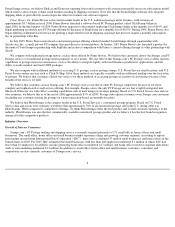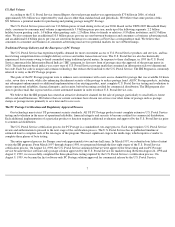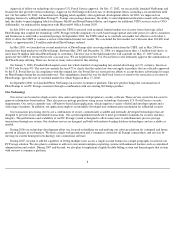Stamps.com 2006 Annual Report Download - page 18
Download and view the complete annual report
Please find page 18 of the 2006 Stamps.com annual report below. You can navigate through the pages in the report by either clicking on the pages listed below, or by using the keyword search tool below to find specific information within the annual report.
Moreover, the applicability of existing laws to the Internet is uncertain with regard to many issues, including property ownership, export of
specialized technology, sales tax, libel and personal privacy. Our business, financial condition and results of operations could be seriously
harmed by any new legislation or regulation. The application of laws and regulations from jurisdictions whose laws do not currently apply to
our business, or the application of existing laws and regulations to the Internet and other online services could also harm our business.
We have employees and offer our services in multiple states, and we may in the future expand internationally. These jurisdictions may
claim that we are required to qualify to do business as a foreign corporation in each state or foreign country. Our failure to qualify as a foreign
corporation in a jurisdiction where we are required to do so could subject us to taxes and penalties. Other states and foreign countries may also
attempt to regulate our services or prosecute us for violations of their laws. Further, we might unintentionally violate the laws of foreign
jurisdictions and those laws may be modified and new laws may be enacted in the future.
Risks Related to Our Stock
Changes in stock option accounting rules will have an adverse affect on our operating results.
We use options to acquire our common stock to attract, incentivize and retain our employees in a competitive marketplace. Statement of
Financial Accounting Standards (SFAS) No. 123, “Accounting for Stock-Based Compensation”, allowed companies the choice of either using
a fair value method of accounting for options that would result in expense recognition for all options granted, or using an intrinsic value
method, as prescribed by Accounting Principles Board Opinion (“APB”) No. 25, “Accounting for Stock Issued to Employees,” with a pro
forma disclosure of the impact on net income (loss) of using the fair value option expense recognition method. Prior to our adoption of SFAS
No. 123 (revised 2004),
“Share Based Payment”, or Statement 123R, on January 1, 2006, we had elected to apply APB No. 25 and accordingly
we generally did not recognize any expense with respect to employee options to acquire our common stock in periods ended on or prior to
December 31, 2005 as long as such options were granted at exercise prices equal to the fair value of our common stock on the date of grant.
Statement 123R requires that the compensation cost relating to share-based payment transactions be recognized in financial statements.
This cost will be measured based on the fair value of the equity instruments issued. We adopted Statement 123R on January 1, 2006, which is
the first day of our 2006 fiscal year. We expect the adoption of Statement 123R to have an adverse effect on our operating results, as we
continue to use options to attract, incentivize and retain our employees.
The tax value of our net operating losses could be impaired if we trigger a change of control pursuant to Section 382 of the Internal
Revenue Code.
Under Internal Revenue Code Section 382 rules, a change in ownership can occur whenever there is a shift in ownership by more than
50 percentage points by one or more five-percent shareholders within a three-year period. When a change of ownership is triggered, the NOLs
may be impaired. We estimate that, as of December 31, 2006 we were approximately at 30% compared with the 50% level that would trigger
impairment of our NOL asset. As part of our ongoing program to preserve future use of our NOL assets, Stamps.com requests that all of our
investors contact us prior to allowing their ownership interest to reach a five-percent level.
Our charter documents could deter a takeover effort, which could inhibit your ability to receive an acquisition premium for your shares.
The provisions of our certificate of incorporation, bylaws and Delaware law could make it difficult for a third party to acquire us, even if it
would be beneficial to our stockholders. In addition, we are subject to the provisions of Section 203 of the Delaware General Corporation Law,
which could prohibit or delay a merger or other takeover of our Company, and discourage attempts to acquire us.
The U.S. Postal Service may object to a change of control of our common stock.
The U.S. Postal Service may raise national security or similar concerns to prevent foreign persons from acquiring significant ownership of
our common stock or of Stamps.com. The U.S. Postal Service also has regulations regarding the change of control of approved PC Postage
providers. These concerns may prohibit or delay a merger or other takeover of our Company. Our competitors may also seek to have the U.S.
Postal Service block
15
























